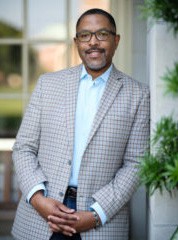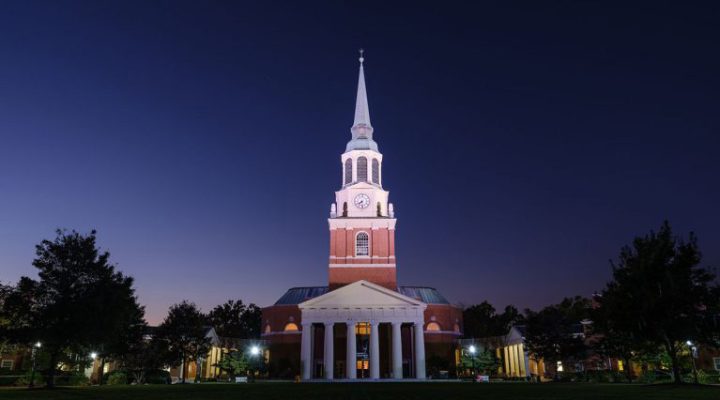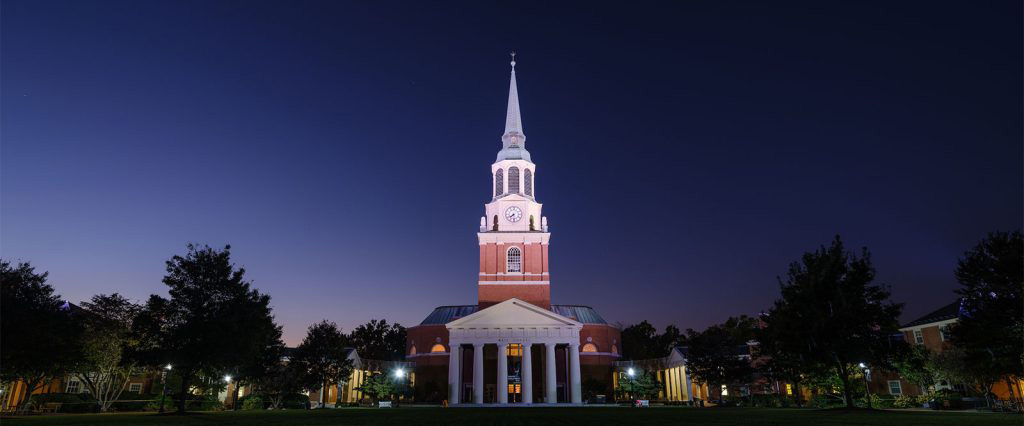Two seminaries that partner with the Cooperative Baptist Fellowship have announced changes to their core curricula that address the changing needs of students seeking theological education.
Wake Forest University School of Divinity has completely revamped its master of divinity degree, traditionally the key degree program for ministerial training and credentialing.
And Baptist Seminary of Kentucky has announced a new 36-hour master of arts in ministry studies degree that can be completed online through live Zoom sessions and is designed for students who want to remain in their full-time ministry or professional positions.
BSK leaders said the new option addresses two trends in congregational ministry: The growing popularity of master of arts degrees instead of master of divinity degrees, and the reality of “homegrown ministers,” people who already are members of churches where they are called out to serve as ministers — often in roles with children, youth or music.
The Association of Theological Schools reported last year that for the first time the number of master of arts students has surpassed the number of master of divinity students enrolled across ATS schools nationwide.
That is a significant shift from the historical pattern of the MDiv, which for decades has been the dominant degree program offered at seminaries and divinity schools.

One problem with the MDiv is the number of credit hours required, which at some seminaries has risen to more than 90 hours — more credits than required for a law degree or a doctorate in history at most universities — yet not considered a “terminal” degree such as a doctorate of a law degree. While the ideal seminarian pushes through the MDiv in an intensive three-year period, more and more students have extended the length of their studies in order to work at the same time.
ATS requires a minimum of 72 credit hours for an accredited MDiv program.
The new MDiv curriculum at Wake Forest is built on that standard, which is still double the 36-hour required minimum for an accredited master of arts degree.
Both BSK and Wake Forest Divinity were launched in response to the schism within the Southern Baptist Convention — two of about a dozen new educational options created in reaction to a fundamentalist takeover of the SBC’s six seminaries.
In the three decades since that catalytic event, theological education nationwide and among all Christian groups has faced intensive challenges. The SBC’s Southwestern Baptist Theological Seminary, once the world’s largest seminary, is a shadow of its former self but the SBC’s Southern Baptist Theological Seminary has grown under a more conservative and Calvinist direction.
Based on data from its member schools in fall 2022, ATS reported: “MDiv enrollment in ATS schools has dropped below 28,000 for the first time in three decades. It first climbed above 27,000 in 1995, and it climbed to a peak of almost 35,000 in 2006. From that point forward, enrollment of MDiv students began a steady downward trend to about 28,500 in 2017. … In the last five years, however, MDiv enrollment began declining again to reach the fall 2022 figure of 27,634. This level is about the same number of students that was reported in fall 1995, when ATS schools numbered 221 (about 60 fewer schools). It is likely that the downward pressure of MDiv enrollment will continue into future years.”
In 2022, ATS reported Wake Forest Divinity with an enrollment of 65 students, down slightly from its reported enrollment of 72 two decades earlier but down significantly from the 112 student enrolled a decade ago.

Corey D. B. Walker
Since its founding in 1999, Wake Forest Divinity has had four deans and one interim dean. Corey D.B. Walker was named dean last year. A top priority for the school in its latest leadership transition was to reimagine the MDiv.
“Wake Forest University School of Divinity set out on an audacious mission in 1999,” Walker said. “Now, as then, we are guided by our audacious mission in challenging and complex times as we equip new generations of students to be ‘agents of justice, reconciliation and compassion for Christian ministries and other ministries.’”
Fitting the demands of a diverse student body today, the new MDiv curriculum at Wake Forest includes only a dozen required courses, with 30 hours devoted to electives. Biblical languages — Hebrew and Greek — are not required but may be added. Required courses include such standards as Old Testament Interpretation, New Testament Interpretation, History of Christianity, Foundations in Christian Ethics or Introduction to Theological Ethics, and other courses on theology, culture, ministry, spirituality and interfaith dialogue.
The curriculum adds two new required courses: Social and Cultural Analysis, to introduce students to interdisciplinary tools and methods for social and cultural analysis; and Practical Theologies for Social Change, “an introduction to theological reflection on the skills and practices central to transformative religious leadership.”
A news release said the new curriculum “is grounded in a recognition of the plurality of Christian traditions and a commitment to theological reflection that is dialogical, collaborative and engaged with a diversity of historical and contemporary voices and perspectives.”
Elizabeth O’Donnell Gandolfo, associate dean for academic affairs, explained: “We are committed to forming faith leaders who embody the work of justice, reconciliation and compassion. The new curriculum offers more paths to see that goal flourish in ways that honor the vocational journey of each student.”
The new MDiv also provides options for seminarians to take courses in the wider university curriculum, something stand-alone seminaries cannot do.
Wake Forest’s new curriculum is built around three key ideas: Integration, interdisciplinary and individualization.
“We are excited to offer our students the opportunity to experience a curriculum that responds to the many pathways that are opened with theological education,” Dean Walker said. “The reimagined curriculum provides distinctive ways for students to experience an individualized and curated learning experience that creatively responds to their unique call and ministerial goals.”


